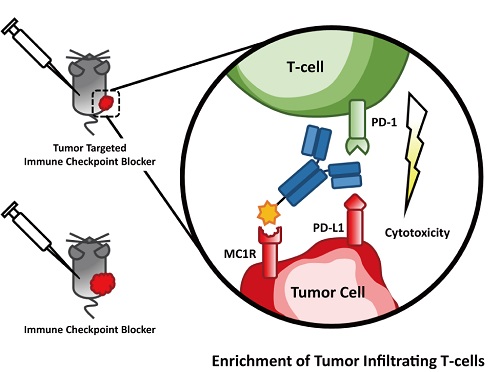Treatment by immunotherapy has shown clinical benefit either as a monotherapy or as part of a combination therapy. While highly effective, immunotherapies are limited for low response rate and primary or acquired resistance. Combining two different immune checkpoint blocking antibodies or combining immunotherapy with chemotherapy or radiotherapy could increase response rates and enhance clinical efficacy. However, current immune checkpoint inhibitors are not tumor-specific, and induce systemic immune activation in other tissues and organs. Combination of immunotherapies further amplify these toxicities, e.g., in melanoma patients, treatment with a combination of Ipilimumab and Nivolumab increased the occurrence of severe side effects by 2-4 fold compared to the monotherapies alone.
To solve this problem, in an article in this issue of PNAS, with collaborations of Feng Wang’s (Institute of Biophysics, Chinese Academy of Sciences), Peter Schultz’s (Scripps Research Institute) and Yu Cao’s (Peking University Shenzhen Graduate School) team, researchers developed a new approach to use bispecific antibodies for tumor-targeted delivery of immune checkpoint blockers.
In this study, researchers developed a bispecific antibody NDP-MSH-αPD-L1 with peptide-antibody conjugation technology to target melanoma. This molecule showed high affinity to melanocortin-1 receptor (MC1R) and PD-L1 expressed on melanoma cells and demonstrated enhanced specific antitumor efficacy in a syngeneic melanoma mouse model as compared to anti-PD-L1 antibody. The tumor growth inhibition results are correlated with the number of infiltrated CD3+ cells in tumors, indicating the efficacy is mediated by activated T cells through PD-L1 blockade.
The remarkable therapeutic advantage of tumor targeted immune checkpoint inhibitor is not limited to melanoma. This strategy could be applied to various types of solid tumors. Dr. Feng Wang’s team is currently working on developing bispecific immune checkpoint inhibitor constructs to target multiple tumors and maximize their therapeutic benefits.
This work has been published in PNAS on Jul 22th, 2019 tilted "A tumor-targeted immune checkpoint blocker ".

Tumor-targeted immune checkpoint blocker NDP-MSH-αPD-L1 showed its anti-tumor efficacy in melanoma tumor-bearing mice.
(Image by Dr. WANG Feng's Group)
Article link: https://www.pnas.org/content/early/2019/07/11/1905646116
Contact: Feng Wang
Institute of biophysics, Chinese Academy of Sciences
Beijing100101, China
Tel: (86)-10-64886852
Email: wangfeng@ibp.ac.cn
(Reported by Dr. WANG Feng's Group)